When ideology trumps evidence: The decision to cancel the school liaison officer program in School District 61
On May 31, 2023 and in what can only be described as a textbook example of ideological decision-based evidence-making, Trustees voted unanimously to cancel the school liaison officer (SLO) program in all School District 61 (SD61) schools (the only school district in BC to do so). The Vancouver School Board, which had previously eliminated school liaison officers in 2021, reinstated them in September 2023.
Remarkably, the SD61 decision was reached without consultation with any Police Board in the region or the leadership of either the Esquimalt or Songhees First Nations. In support of their decision, School Board Chair, and former BC Green candidate for Oak Bay-Gordon Head, Nicole Duncan demonstrated a fundamental misunderstanding of the role of SLOs and the community policing model (ironically in a community she wanted to represent in the BC Legislature) by stating “Police are being asked to fill in gaps in student support and to take on roles that should be filled by individuals with specialized expertise, such as youth and family counsellors and social workers“.
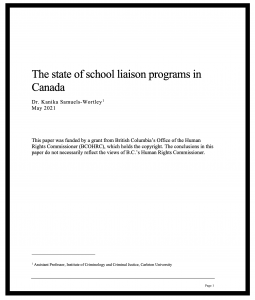 The SD61 decision built on a bizarre press release issued by the BC Office of the Human Rights Commissioner on November 22, 2022: Letter to school trustees on human rights concerns with the use of School Liaison Officers in B.C. schools. While obviously an overreach of the mandate of the unelected BC Human Rights Commissioner, she stated “I strongly recommend that all school districts end the use of SLOs until the impact of these programs can be established empirically. ” I was serving on the the Oak Bay Police Board at the time and was very familiar with Oak Bay’s community policing model and the important preventative role that school liaison officers play in such a model. I had hoped the Human Rights Commissioner letter was supported by extensive research on SLOs in BC Schools. Sadly, all that I could find was a single report commissioned by her office known as the Samuels-Wortley report.
The SD61 decision built on a bizarre press release issued by the BC Office of the Human Rights Commissioner on November 22, 2022: Letter to school trustees on human rights concerns with the use of School Liaison Officers in B.C. schools. While obviously an overreach of the mandate of the unelected BC Human Rights Commissioner, she stated “I strongly recommend that all school districts end the use of SLOs until the impact of these programs can be established empirically. ” I was serving on the the Oak Bay Police Board at the time and was very familiar with Oak Bay’s community policing model and the important preventative role that school liaison officers play in such a model. I had hoped the Human Rights Commissioner letter was supported by extensive research on SLOs in BC Schools. Sadly, all that I could find was a single report commissioned by her office known as the Samuels-Wortley report.
I thoroughly reviewed the Samuels-Wortley report. It provides a literature review of studies pertaining to SLO programs in Canada and the United States. First, it’s important to note that the author states on page 3 of her report “an extensive review of the literature reveals no peer-reviewed studies that explore the impacts of Canadian SLO programs on marginalized students.” In fact, one of the five peer-reviewed Canadian studies the author found pertaining to Canadian SLOs suggested positive outcomes when introduced as a component of a community policing model (Broll and Howells, 2019).
 The US-based research reviewed in the Samuels-Wrotley report focussed on the “school-to-prison” pipeline, violence, US-based SLO training protocol etc. and cannot be generalized to Canada. Even the Toronto Police internal evaluation reviewed in the Samuels-Wortley report is not generalizable to Greater Victoria as they were assessing a targetted SLO program introduced after the fatal shooting of a student at a Toronto high school, not as a key component of a community-policing framework.
The US-based research reviewed in the Samuels-Wrotley report focussed on the “school-to-prison” pipeline, violence, US-based SLO training protocol etc. and cannot be generalized to Canada. Even the Toronto Police internal evaluation reviewed in the Samuels-Wortley report is not generalizable to Greater Victoria as they were assessing a targetted SLO program introduced after the fatal shooting of a student at a Toronto high school, not as a key component of a community-policing framework.
The SD61 decision was also supported by a thoroughly debunked letter from the Greater Victoria Teacher’s Association who had apparently not surveyed their members before coming up with their supposedly (but clearly not) researched ideological position. On the other hand, the Victoria Principals’ and Vice Principals’ Association, whose members are in charge of individual school management wrote a strong letter of support for SLOs to the Board of Trustees that was apparently ignored.
What’s most odd about the GVTA letter is that in April 2018, when I was serving in the BC Legislature as the MLA for Oak Bay-Gordon Head, Victoria Police cut their SLO program after not being given the resources to maintain their frontline services. By December 2018, the Greater Victoria Teacher’s Association began a campaign to get police liaison officer’s back in Victoria Schools that continued into 2019 as school-based incidents started to rise. The GVTA’s dramatic policy lurch strikes me as a textbook example of what happens when one or two idealogues start ramming through their agenda while claiming to speak on behalf of the collective.
 Rather than choosing to consult with those delivering or providing oversight into the SLO program, School Board Trustees seemed to be swayed by those purporting to have uncovered gotcha evidence from FOI information they received. The egregious misinformation brought forward in this regard provided the “evidence” to support the ideological narrative needed to justify a predetermined decision (so-called decision-based evidence-making) to eliminate SLOs from SD61 schools. For example, on X (formerly known as Twitter), one activist offered gotcha ‘proof’ that VicPD were targeting members of the BIPOC community. They pointed out that 19% of all “youth suspects” arrested by VicPD were indigenous whereas only 5% of the population was indigenous. What they failed to point out was that the data they were looking at was aggregate rather than individual data. To illustrate this, suppose there were 100 arrests & one BIPOC individual committed 19 of them. Suppose the other 81 were committed by 81 different other folk. Then the statistic is only 1.2% of people VicPD labeled as “youth suspects” were BIPOC. Perhaps the activists would have served our community better if they educated themselves on the data before making incorrect assertions.
Rather than choosing to consult with those delivering or providing oversight into the SLO program, School Board Trustees seemed to be swayed by those purporting to have uncovered gotcha evidence from FOI information they received. The egregious misinformation brought forward in this regard provided the “evidence” to support the ideological narrative needed to justify a predetermined decision (so-called decision-based evidence-making) to eliminate SLOs from SD61 schools. For example, on X (formerly known as Twitter), one activist offered gotcha ‘proof’ that VicPD were targeting members of the BIPOC community. They pointed out that 19% of all “youth suspects” arrested by VicPD were indigenous whereas only 5% of the population was indigenous. What they failed to point out was that the data they were looking at was aggregate rather than individual data. To illustrate this, suppose there were 100 arrests & one BIPOC individual committed 19 of them. Suppose the other 81 were committed by 81 different other folk. Then the statistic is only 1.2% of people VicPD labeled as “youth suspects” were BIPOC. Perhaps the activists would have served our community better if they educated themselves on the data before making incorrect assertions.
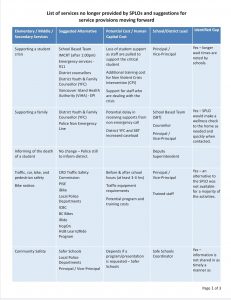 In another example, a powerpoint presentation to a School District committee on SLOs seemed to have been particularly influential even though none of the purported “gotcha” statistics were checked with VicPD and most were misinterpreted. Sadly with gangs now having increased access to schools, vulnerable youth become easy victims for grooming into gang life. But that’s not the only consequence of the irresponsible School Board decision. Here’s an incomplete list of what the Board has identified as services the SLOs used to provide that now fall into the responsibility of already overburdened principals and vice-principals, along with the District’s lone Safe Schools Coordinator. This list also illustrates the challenges faced by schools and students since the removal of the SLOs.
In another example, a powerpoint presentation to a School District committee on SLOs seemed to have been particularly influential even though none of the purported “gotcha” statistics were checked with VicPD and most were misinterpreted. Sadly with gangs now having increased access to schools, vulnerable youth become easy victims for grooming into gang life. But that’s not the only consequence of the irresponsible School Board decision. Here’s an incomplete list of what the Board has identified as services the SLOs used to provide that now fall into the responsibility of already overburdened principals and vice-principals, along with the District’s lone Safe Schools Coordinator. This list also illustrates the challenges faced by schools and students since the removal of the SLOs.
• Longer wait times accessing crisis support for students.
• Loss of student support as staff are pulled to support the critical student.
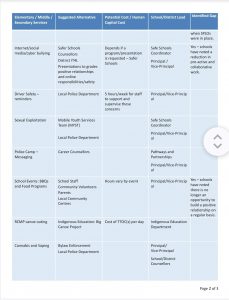 • Additional training cost for Non-Violent Crisis Intervention (CPI).
• Additional training cost for Non-Violent Crisis Intervention (CPI).
• Support for staff dealing with the crisis.
• Delays in receiving supports from police departments nonemergency calls.
• District Youth and Family Counsellor (YFC) and School-Based-Team (SBT) increased caseload.
• Alternatives are not available for a majority of activities.
• Additional program, training, and equipment costs.
• Information around community safety is not being shared in a timely manner.
• Reduction in pro-active and collaborative work around internet/social/media/cyber bullying.
• No longer an opportunity to build a positive relationship on a regular basis.
• Increase in vandalism and graffiti on school grounds.
• Students no longer have an opportunity to learn through a police focused lens.
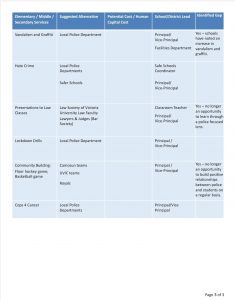 • There is no longer an opportunity to build positive relationships between police and students on a regular basis.
• There is no longer an opportunity to build positive relationships between police and students on a regular basis.
The following programs or presentations are missing from this list that the District provided:
• Gangs in (BC)
• Personal Safety
• Female Personal Safety
• Halloween Safety
• Healthy/unhealthy Relationships
• Human Trafficking
• LGBTQ Presentations
• PARTY program
• Property & Vehicle Crime
• Shoplifting
• Stranger Danger
• Street Drugs
• WITS program
• Mentor individual students
While at present, the Board of Education is certainly within its right to ban SLOs from their schools, community safety falls within provincial and local government jurisdiction. My hope is that the province will step in to rectify what has happened in SD61 through the introduction of legislation or regulation to ensure that such ill informed decisions cannot occur in the future without either provincial approval or consultation with the affected police boards (charged with oversight of policing). Nobody’s interests are served when our collective safety is undermined by poorly thought through decisions that are grounded in nothing more than ideology and virtue signalling.
I wish to offer my sincere thanks to all police officers in our region for their continued service to our community. I can only imagine how decisions like this, based on nonsensical rhetoric and misleading information, affect your morale. Yet the same activists undermining our region’s policing would almost certainly be the first ones to call for your help when a problem arises. Finally, I can’t imagine how police officers feel as they go to pick their children up at school while dressed in uniform knowing that new school district policy requires schools to log when officers are on school property.
Shame on the Greater Victoria School Board.

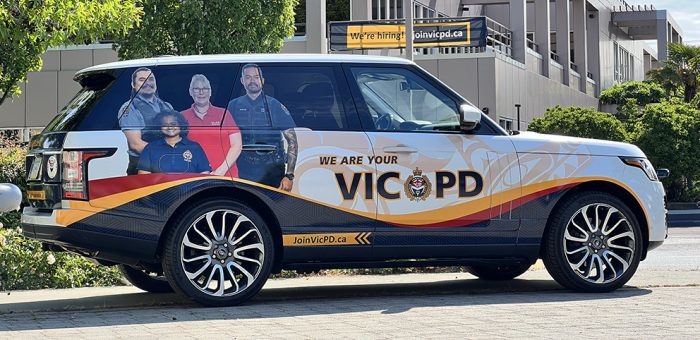



One Comment
Dr Weaver,
Thank you for your powerful ,evidence based statement in support of Police School Liaison Officers in sd61.
Your stellar reputation in our community makes your voice particularly important.
Your article would make an excellent “Comment” piece in the Times Colonist. Have you approached Editor Obee to propose this?
And would you consider publically supporting Chief Manek in his crusade to save our children and our community from terrible harms.
Our children are a fight worth fighting for.
I hope you will consider entering the ring.
With thanks
Mary Kelly